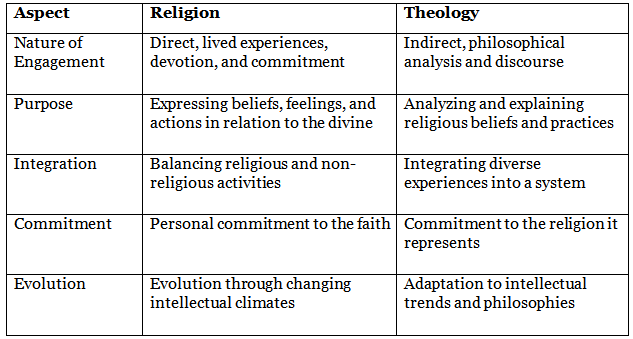UPSC Exam > UPSC Notes > Philosophy Optional for UPSC > Religion and Theology - Philosophy of Religion
Religion and Theology - Philosophy of Religion | Philosophy Optional for UPSC PDF Download
| Table of contents |

|
| Religion and Theology |

|
| The Role of Philosophy in Religion |

|
| Comparison between Religion and Theology |

|
| Distinction Between Theology and Philosophy |

|
Religion and Theology
- Religion as Lived Experience: Religion encompasses our lived experiences, including the language we use to express our thoughts, feelings, and actions in relation to an object of devotion and commitment.
- Belief in God: For example, a theist engages in prayer, conversations with God, and turns to Him in moments of distress, elation, and gratitude. Their belief in God is unwavering, requiring no proof of His existence.
- Integration of Religious and Non-Religious Life: Balancing religious and non-religious activities is necessary. Believers must earn a livelihood, maintain social connections, and engage in various societal, political, cultural, and intellectual pursuits.
- Challenges of Integration: It's challenging to maintain a strict separation between religious and non-religious life due to the demand for an integrated existence.
The Role of Philosophy in Religion
- Philosophy in Integration: To unify diverse and competing experiences, believers utilize the intellectual categories of their time. This philosophical engagement in integration is known as philosophizing.
- Theology as Philosophical Discourse: Theology, literally "discourse about God," involves discussing and analyzing religious beliefs and practices, not direct communication with God.
- Theology as Philosophy of Religion: Theology represents the philosophy of a specific religion. Different religions may have various theological approaches, and even within the same faith, multiple theological perspectives can exist.
- Defense and Dialogue: Theology often defends religious beliefs against skeptics, agnostics, and challenges from other religions.
- Inherent Commitment: Theology is not a disinterested study but is deeply rooted in the commitment to the religion it represents.
- Second-Order Thinking: Theology is second-order thinking, focusing on contemplation and analysis of religious thought and concepts. It involves thinking about religious thinking.
- Evolution of Theology: Theological perspectives evolve with changes in intellectual trends. Theologies adapt to the shifting intellectual climate from one era to another.
- Adaptation to Intellectual Trends: Theological thought has incorporated various philosophical frameworks throughout history, including Greek philosophy, Aristotelian philosophy, Hegelianism, and existentialism, based on the prevailing intellectual climate.
Comparison between Religion and Theology

In summary, religion encompasses lived experiences, including devotion and commitment to a higher power, while theology is the philosophical discourse and analysis of religious beliefs and practices. Theology is deeply committed to the religion it represents and evolves in response to changing intellectual trends.
Distinction Between Theology and Philosophy
- Role of Theologians and Philosophers: Theologians primarily employ philosophical techniques to clarify, interpret, and defend specific religious beliefs and practices, while philosophers have a broader task of constructing a conceptual framework for a wide range of human experiences.
- Philosophy and Science: Present-day philosophy, particularly analytic philosophy, is heavily influenced by science and seeks to depersonalize its subject matter. This focus on scientific discourse contrasts sharply with the self-involved and passionate nature of religious thinking.
- Existentialism and Theology: Existentialist philosophy, in contrast, emphasizes individual creativity, personal decision-making, and crises, making it more suitable for theology. Theologies like those of Karl Barth, Rudolf Bultmann, and Paul Tillich align better with existentialist philosophy than analytic philosophy.
Integration of Religious and Secular Life
- Balancing Religious and Secular Life: Theologians must engage with contemporary philosophy to harmoniously merge their religious and non-religious experiences. Failing to do so leads to a disintegration of one's personality and is not conducive to healthy living.
- Encounter of Religions: With multiple theologies aspiring to become world theologies, there arises a need for philosophical theology, which aims to clarify the concepts of various theologies and promote mutual understanding and dialogue among thinkers of different faiths.
- Religious Ambiguities: Ambiguities in religious terms, such as 'God' and 'religion,' must be clarified, and their implications worked out for religious philosophy.
- Religious Philosophy: Religious philosophy applies the techniques and disciplines of contemporary philosophy to analyze, elucidate, and clarify religious and theological concepts and beliefs, differentiating it from theology.
Scope and Nature of Religious Philosophy
- Nature of Religious Philosophy: Religious philosophy is a branch of philosophy with a specialized subject matter, focused on the analysis of religious and theological concepts and beliefs.
- Scope of Religious Philosophy: While broader in scope than theology, religious philosophy is narrower than general philosophy, with a distinct emphasis on religious concepts and beliefs.
Religion, Theology, and Religious Philosophy
- Religion and Belief: In religion, believers use religious concepts and beliefs without critical analysis, emphasizing the nurturing of the soul. Theology, in contrast, is more intellectual and tied to a realm of commitment and self-involvement.
- Role of Theologians: Prominent theologians like Karl Barth, Rudolf Bultmann, Paul Tillich, and Dietrich Bonheffer are deeply immersed in their Christian faith.
- Religious Philosophy's Objective Inquiry: Religious philosophy takes an objective and disinterested approach to understanding various religions, their theologies, and the mutual dialogue between theologians of different traditions.
Role of Philosophers and Theologians
- Detached Objectivity: Both philosophers and theologians need to balance self-involvement and detachment. Philosophers remain committed to finding truth and rigorously analyzing religious phenomena and thought, while theologians must strive for universal validity in their ultimate concerns for humanity.
Theologians use philosophy to support specific religious beliefs and practices, whereas philosophers have a wider scope, focusing on human experiences, often influenced by science. Philosophical theology seeks to bridge the gap between different religious perspectives, while religious philosophy analyzes and clarifies religious and theological concepts, maintaining a balance between self-involvement and detached objectivity.
The document Religion and Theology - Philosophy of Religion | Philosophy Optional for UPSC is a part of the UPSC Course Philosophy Optional for UPSC.
All you need of UPSC at this link: UPSC
|
60 videos|168 docs
|
Related Searches




















